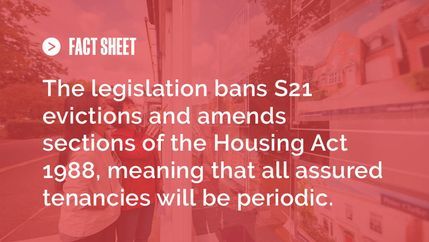
End of fixed-term tenancies
The Bill abolishes fixed-term assured shorthold tenancies (ASTs). All new and existing tenancies will become periodic (rolling) agreements, with tenants free to leave at any time by giving two months’ notice.
For student lets, this is a fundamental shift. At present, fixed terms aligned with the academic year provide certainty for landlords and ensure accommodation is ready for new cohorts each September. Under the new system, students may:
- Leave in June after their exams, creating long summer voids that are difficult to fill until the next academic year.
- Quit early in the year if they drop out of their course, leaving properties empty or part-empty for months.
Purpose-built student accommodation (PBSA) providers registered under approved codes are exempt from the fixed-term ban, giving them a competitive advantage over the private rented sector.
Ground 4A possession rights
The Bill includes a mandatory possession ground (Ground 4A) allowing landlords of student HMOs (three or more tenants) to regain possession at the end of an academic year. Following Propertymark’s campaign, the House of Lords has voted to extend Ground 4A to one- and two-bedroom student lets.
This would safeguard the student lettings cycle across the whole market. However, the amendment must still be agreed by the House of Commons. If MPs reject it, smaller student lets may lose this vital protection.
Cap on rent in advance
The Bill limits landlords to requesting no more than one month’s rent in advance. While this aims to reduce barriers for tenants, it has serious implications for international students. Many do not have UK-based guarantors and currently secure accommodation by paying several months upfront. Without that option, some landlords may be reluctant to rent to them.
Why it matters for agents and landlords
There are 2.2 million full-time students in the UK, with around 80% living away from home. The smooth running of the student lettings cycle depends on properties being available each September. If landlords lose confidence in regaining possession or fear prolonged voids, supply could fall sharply. This risks:
- Higher rents as landlords and agents attempt to offset greater uncertainty.
- Reduced supply if landlords exit the student market altogether.
- Tougher competition with PBSA, which retains the ability to offer fixed-term contracts.
At the same time, the Bill could encourage more flexible rental models, such as shorter lets for exchange students, extended stays for postgraduate researchers, summer lets for visiting academics.
How letting agents can prepare
- Review tenancy agreements
Ensure agreements reflect the move to periodic tenancies and are clear about notice periods. - Plan for check-out alignment
Encourage landlords to align tenancy marketing and check-out processes with academic calendars as far as possible. - Strengthen relationships with universities
Work with local institutions, student unions, and accommodation offices to anticipate demand and manage early departures. - Advise landlords on risk management
Help clients understand how voids may increase and explore rent guarantees, insurance products, or more flexible tenant profiles. - Diversify offers
Explore short-term, postgraduate, or summer rental opportunities that periodic contracts may make easier to manage. - Stay close to legislative updates
The Lords’ amendment on Ground 4A for smaller properties is not guaranteed. Keep clients informed of developments and encourage them to make their concerns known to MPs.
What Propertymark is doing
Propertymark has consistently warned that abolishing fixed terms without robust possession grounds will harm the student housing market. Our lobbying secured the Lords’ extension of Ground 4A to one- and two-bedroom student lets, and we are pressing MPs to uphold it in the Commons. Plus, we are challenging Ministers on the unintended consequences of capping rent in advance, particularly for international students.
We will keep members updated as the legislation progresses, and provide practical guidance to help them support their landlords and tenants, and maintain confidence in the student market.
Renters' Rights Act
The Renters’ Rights Act 2025 received Royal Assent on 27 October 2025. The first phase of reforms will take effect on 1 May 2026, marking the most significant shift to tenancy law in a generation. From this date, all existing and new private tenancies in England will move onto the new system.








